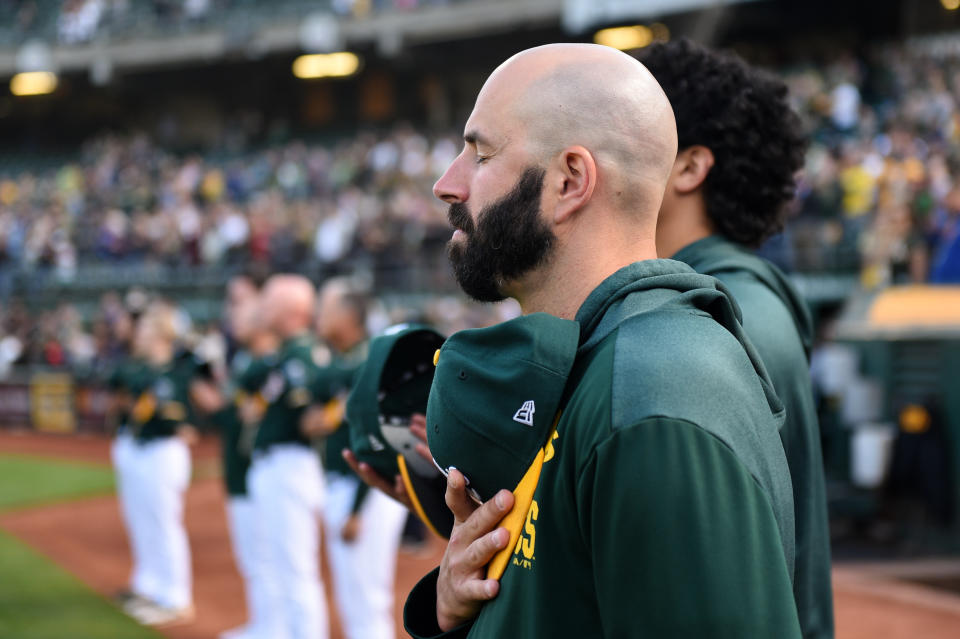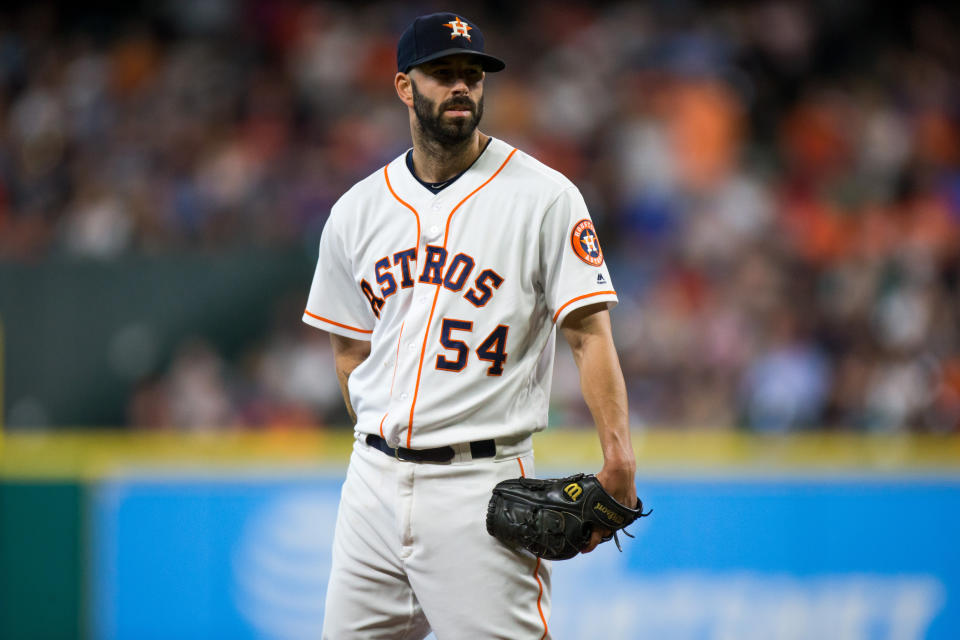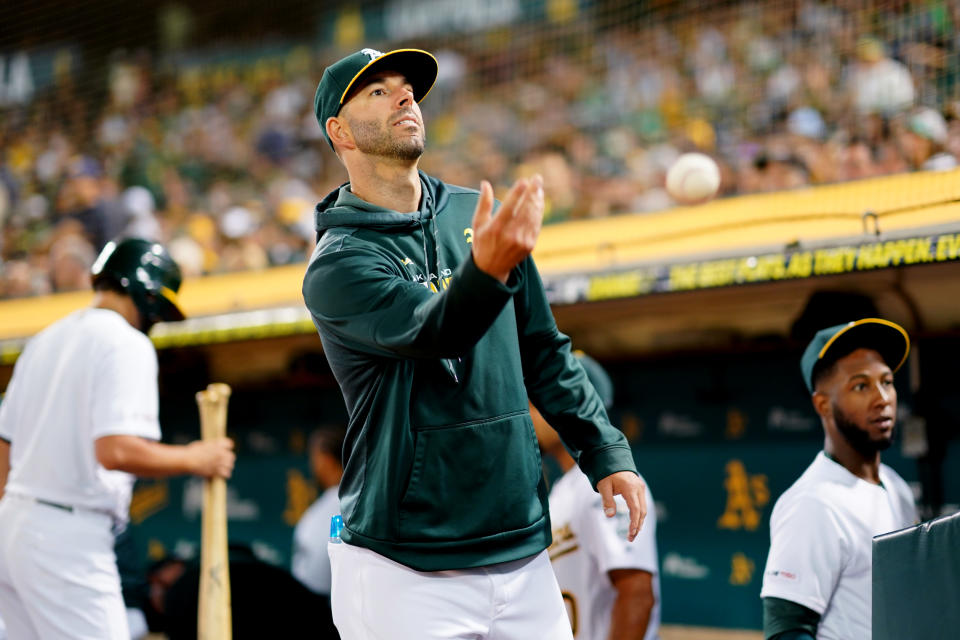Hero or snitch: Baseball has mixed feelings toward whistleblower Mike Fiers

Guardian or snitch, depends on the lighting.
Mike Fiers, the 34-year-old journeyman pitcher whose two career complete games are also no-hitters, one of those as a Houston Astro, nearly four weeks ago blew the whistle on a technology-driven, sign-stealing scheme allegedly run by those Astros. Major League Baseball has questioned dozens of potential perpetrators, accomplices and witnesses (including Fiers) in an investigation that threatens to expose the finest era in Astros history as, at best, suspicious.
Fiers pitched for the Astros for 2 1/2 seasons, the last in 2017, during which, he told The Athletic, the team devised and integrated a system that identified catchers’ signs and relayed them to hitters in the batter’s box. The Astros won the World Series. Fiers, whose ERA that season was 5.22 (and nearly 10 in the final two months), was not on the rosters for any of their three postseason series. He was non-tendered a month later. And, he told The Athletic, he spent the next two seasons warning teammates with the Detroit Tigers and Oakland A’s of the Astros’ deviousness.
This October, the Astros returned to the World Series. In November, Fiers went public. The league and the Astros might never be the same. Fiers, too.
So, who is Mike Fiers and why now? Of the dozens of people who would have seen or been aware of (and benefitted from) the illegal setup described by Fiers — a system protected by a code of secrecy that dates to the first locker room — what moved Mike Fiers, and only Mike Fiers, to reveal the scheme, potentially crippling careers and an organization? At risk, too, was Fiers’ place in the fraternity of generations of ballplayers who went along, who shrugged and decided it — whatever that day’s it was — was someone else’s problem. Teammates don’t rat. Teammates are loyal. Even ex-teammates. What happens in the clubhouse — in this case, allegedly, down the hall from the clubhouse — remains forever there. It’s how the game and the people in it have survived each other. Or, perhaps, how we got here.
A call to Fiers’ agent, Bob Garber, brought a promise to ask Fiers if he would discuss the reasons he made his public accusations.
If he would explain why he’d waited two years before doing so. If he’d considered the consequences, both for the Astros and himself. What the reaction of his fellow players has been since. If he would describe what was in his heart and head when he’d chosen this course. If it has played out like he’d hoped. If this was meant to reflect who he is as a man, if he’d stood for the integrity of the game, or if he’d intended to settle a score. If he was proud of what he’d wrought, and all that is to come.
Subsequent phone calls were ignored, however. Follow-up messages went unreturned.
A representative for the Oakland A’s, Fiers’ current team, said he would speak to Fiers. He called back to say Fiers would “pass” on the story.
Hero or snitch, depends on the lighting, and maybe Mike Fiers doesn’t care which.
“Heroic,” said one current American League West player. “Takes big nuts to call bull--- on people and stand there and take the heat that follows. I admire that.”
“Freakin’ punk-ass bitch,” said a former Astro.
“Mike Fiers?” said a current Astro. “Then give back your ring and your World Series share.”
“He did the right thing,” said a player whose team lost to the Astros in the 2017 postseason. “But I don’t think he’s a hero or a villain. I just hope he doesn’t get demonized.”

The immediate fallout for Fiers appears to be minimal, beyond the news of the investigation and a date with a league investigator. Astros players and management have not publicly challenged his accusations. Opposing players — whether supportive of Fiers or not — have been silent, for the most part. As in the steroid era, omerta comes first, even at the expense of wins and paydays and fairness, and also in the interest of self-preservation. The Astros are not the only team to have tested the boundaries — drawn or assumed — of sign stealing. Public outrage may be cleansing. It also draws unwanted attention. Major League Baseball does seem to be in an investigative mood.
Fiers the teammate has been described as well-liked, approachable, usually part of the leadership clique wherever he goes. To the media, he is cordial and often insightful. He has been honest, by all appearances, sometimes to his detriment. Two years ago, during an unsightly start against the Los Angeles Angels, he threw a pitch near the head of Luis Valbuena, a former teammate. In an earlier at-bat, Valbuena had homered and flipped his bat with uncommon flair. Asked afterward about the pitch, Fiers told reporters, “What he did to me, I took it as disrespect.” Fiers was suspended for five games. Hardly anyone admits to throwing at hitters. For Fiers, it seemed, right was right, and he cared not who knew.
Two years later, he told the world the Astros were cheats. He would live with the consequences, as would they.
Hero or snitch?
“Uhh, complicated,” said a National League senior baseball operations official. “I mean, ‘snitch,’ for me, is more as it’s happening or to get out of some trouble. So it’s not snitch. I see it as gray. This falls into that.”
“I wouldn’t feel too good about him,” a player agent said. “You have to ask him why he chose to do it. I think he’ll have a hard time. I don’t know if he can be trusted.”
“That two-year gap keeps him from being a hero,” a major league scout and former major league player said. “I would not have gone public, but I don’t condemn him for going public. ... In the end, I probably would have fallen back on the sanctity of the clubhouse. Would I have felt good about it? Probably not.”
“Ed Snowden, Julian Assange, hero or snitch?” said a former big-league player. “Guess it depends which side of the fence you’re on. I will say the Astros weren’t very discreet about their tactics.”
Adam Waytz, psychologist, associate professor in the Kellogg School of Management at Northwestern, author of “The Power of Human: How Our Shared Humanity Can Help Us Create a Better World” and an expert on the subject of whistleblowers (and, for NBA fans of a certain age and mood, a founder of the brilliant and defunct FreeDarko.com), says the conversation often can be pared to the concepts of — and, perhaps, the tug between — loyalty and justice. This would be especially true in sports and, for another, a military culture, he says, where the root value is loyalty. The I-got-your-back-you-got-mine brotherhood of the arena. When one of them strays, the backlash can be swift and relentless.
“In baseball,” says Waytz, who grew up in Minneapolis as a Minnesota Twins fan, “there is some sacredness to the team culture. It’s seen as more of a betrayal in this context. … We don’t air it to the public.”
Fiers did not expose the Astros at the time he alleges they illegally stole signs. When, two years later, after presumably weighing the factors of loyalty and justice (and watching the Astros return to the World Series), he did make his accusations, they were not directed to Major League Baseball, but to a media outlet. According to MLB sources, Fiers did not first seek satisfaction through the league. That path ensured not only a formal investigation, but also a very public trying of the Astros, their players, coaches, front office and a span in which the team has won 311 games (and two AL pennants) in three seasons.
Whistleblowers in other arenas — banking, energy, government, corporations — would go to the media, Waytz said, if they perceived the standard enforcement protocols (superiors, human resources, investigative bodies) to be insufficient and often as a last resort. If Fiers had communicated his information to teammates and coaches, if he knew other teams had reported suspicious activity to the league without remedy, then perhaps he saw public pressure as his only weapon for change.

“The question is, do you view MLB as legitimate and a system that really cares about this stuff?” Waytz says. “I don’t think there’s really a right answer for what the whistleblower should do. They go to the source that provides the justice they’re looking for.”
In an environment such as Major League Baseball, those suspected of skirting the rules — big or small, game-altering or incidental, cameras and trash cans or dabs of pine tar — can be viewed as more respectable than those who would condemn them for it. There are, too, hardball versions of misdemeanors and felonies. Some get a brushback pitch. Others get chased by MLB investigators.
“To go to the lengths the Astros supposedly did,” says Waytz, “nobody makes a bad decision overnight. To become this unethically severe, it happened along a slippery slope. By the time you get to a decision to commit a serious crime, you’ve already been committing small crimes along the way that make the big crime more palatable.
“Unless you’re a psychopath, and less than 1 percent of the population is, they rationalize. We’re good at rationalizing and we need to be good at it, because we do dumb things by nature. … The rationalization is, ‘I’m only one part of a large system. Everybody else does it.’ So when I teach ethics, I say that it’s not really the people. When unethical things happen, it’s not necessarily because of bad people. It can be the organizational structures that incentivize people to engage in this.”
Fiers’ revelations brought the investigators and dire consequences, potentially damaging the clubhouse he once left and perhaps chilling the next one he walks into. So far, it is unknown if any of those ‘17 Astros also wondered, “What are we doing here?” Or, “Is this the way we want to win games?” Or, even, “Can everyone be trusted?”
Hero or snitch? Depends on the lighting.
“Both?” said a former big-league player. “I think it would be more heroic had this come out when he witnessed it. … He did snitch, but usually snitching, at least in the contemporary sense, is self-serving. He doesn’t really benefit from this. I guess the predominant thought in my head would be, ‘This is going to make me wildly unpopular.’”
More from Yahoo Sports:

